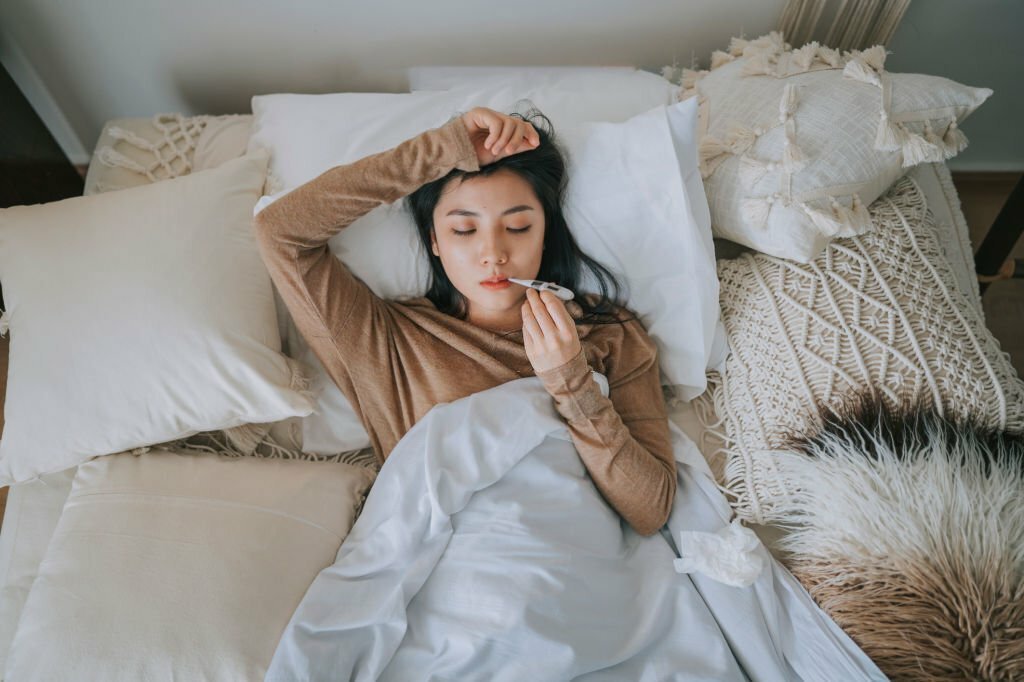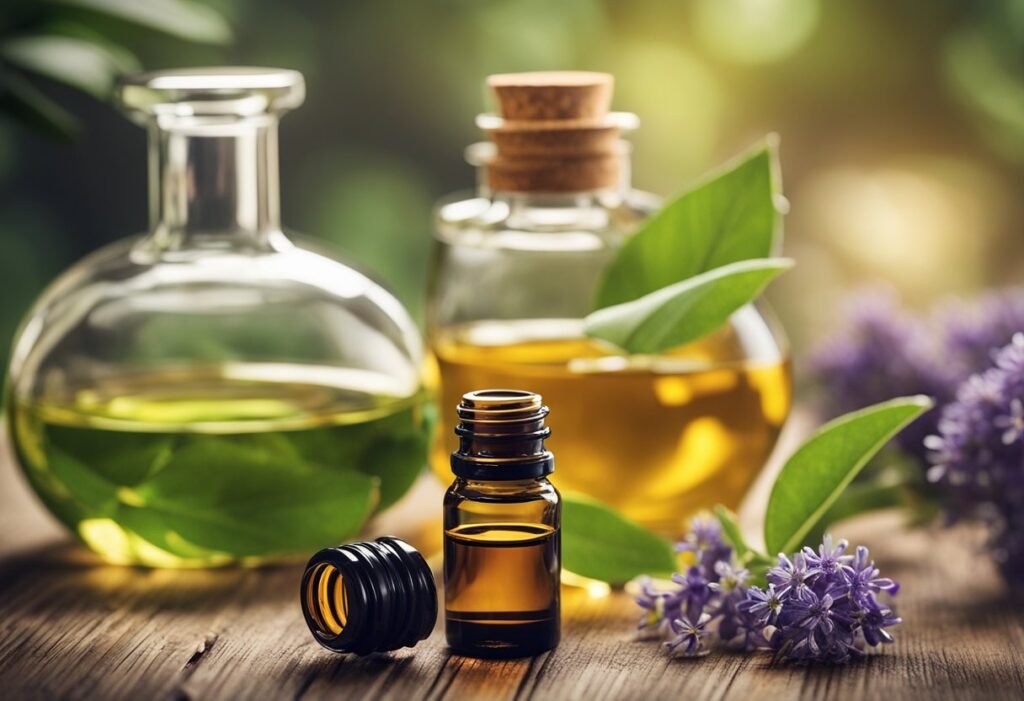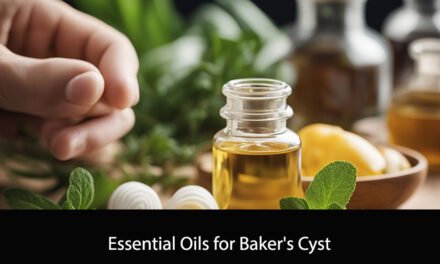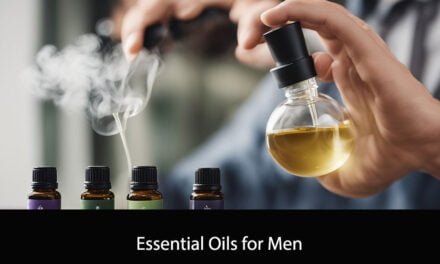Essential oils have been used for centuries to treat a variety of ailments, including fevers. When used correctly, essential oils can help reduce fever symptoms and promote overall wellness. In this article, we will explore the benefits of using essential oils for a fever and provide some tips on how to use them safely and effectively.
First, it’s important to understand what causes a fever. A fever is a sign that your body is fighting off an infection or illness. Common symptoms include a high temperature, sweating, chills, and fatigue. While a fever can be uncomfortable, it’s actually a good thing – it means your body is doing its job and trying to heal itself. However, if a fever is too high or lasts for too long, it can be dangerous. This is where essential oils can come in handy.
In the next section, we will discuss some of the best essential oils for a fever and how to use them. Keep in mind that while essential oils can be helpful, they should never be used as a substitute for medical care. If you have a fever that lasts for more than a few days or is accompanied by other symptoms, be sure to see a healthcare professional.
Understanding Essential Oils

Essential oils have been used for centuries to alleviate various health issues, including fever. These oils are highly concentrated plant extracts that contain the natural aroma and flavor of the plant. They are extracted from different parts of the plant, including leaves, flowers, and roots, and are known for their therapeutic properties.
When it comes to fever, essential oils can help reduce body temperature, ease headaches, and relieve muscle aches and pains. However, it is important to note that essential oils should not be used as a replacement for medical treatment. If you have a fever, seek medical attention from a healthcare professional.
Essential oils can be used in a variety of ways, including inhalation, topical application, and ingestion. Inhalation involves diffusing the oil into the air using a diffuser or inhaling the aroma directly from the bottle. Topical application involves diluting the oil with a carrier oil and applying it to the skin. Ingestion involves adding the oil to food or drinks.
It is important to use caution when using essential oils, as they are highly concentrated and can cause skin irritation or other adverse reactions if used improperly. Always dilute the oil with a carrier oil before applying it to the skin, and avoid ingesting essential oils unless under the guidance of a healthcare professional.
Some essential oils that may be helpful for fever include peppermint, eucalyptus, lavender, and tea tree oil. Peppermint oil can help reduce body temperature and relieve headaches, while eucalyptus oil can help clear nasal congestion. Lavender oil can help reduce stress and promote relaxation, while tea tree oil has antibacterial and antiviral properties.
Overall, essential oils can be a helpful addition to your fever treatment plan when used properly and under the guidance of a healthcare professional.
How Essential Oils Work for Fever
Essential oils are highly concentrated plant extracts that have been used for centuries to treat various ailments. When it comes to fever, essential oils can help to reduce the body’s temperature and alleviate symptoms such as headaches, body aches, and fatigue.
One of the primary ways that essential oils work for fever is by stimulating the immune system. Many essential oils contain compounds that have antiviral and antibacterial properties, which can help to fight off the underlying infection that is causing the fever. Additionally, some essential oils have anti-inflammatory properties that can reduce swelling and inflammation in the body, which can help to bring down a fever.
Another way that essential oils work for fever is by promoting relaxation and reducing stress. Fever can be stressful on the body, and stress can exacerbate symptoms. Essential oils such as lavender, chamomile, and ylang-ylang can help to calm the mind and promote relaxation, which can help to reduce stress and improve overall well-being.
When using essential oils for fever, it is important to remember that they should not be used as a substitute for medical treatment. If you have a fever that lasts for more than a few days, or if you have other symptoms such as difficulty breathing or chest pain, you should seek medical attention immediately.
Overall, essential oils can be a safe and effective way to alleviate symptoms of fever and promote overall well-being. By stimulating the immune system, reducing inflammation, and promoting relaxation, essential oils can help to reduce the severity of fever symptoms and improve overall quality of life.
Top Essential Oils for Fever

When it comes to treating fever, essential oils can be a natural and effective remedy. Here are some of the top essential oils that can help reduce fever symptoms:
Peppermint Oil
Peppermint oil is known for its cooling and soothing properties. It can help reduce fever by promoting sweating, which helps to lower body temperature. To use peppermint oil for fever, dilute a few drops in a carrier oil and apply to the forehead and temples.
Eucalyptus Oil
Eucalyptus oil has antiviral and antibacterial properties, making it a great choice for fighting off infections that can cause fever. It also has a cooling effect on the body, which can help to reduce fever symptoms. To use eucalyptus oil for fever, add a few drops to a diffuser or inhale directly from the bottle.
Lavender Oil
Lavender oil is known for its calming and relaxing properties. It can help reduce fever by promoting relaxation and reducing stress, which can help to lower body temperature. To use lavender oil for fever, add a few drops to a warm bath or dilute in a carrier oil and apply to the chest and neck.
Chamomile Oil
Chamomile oil has anti-inflammatory and antispasmodic properties, which can help to reduce fever symptoms such as inflammation and muscle aches. It also has a calming effect on the body, which can help to promote relaxation and reduce stress. To use chamomile oil for fever, add a few drops to a warm bath or dilute in a carrier oil and apply to the chest and neck.
Remember to always dilute essential oils before use and consult with a healthcare professional if you have any concerns or questions.
How to Use Essential Oils for Fever

When it comes to using essential oils for fever, there are several methods that can be effective. Here are the three most common ways to use essential oils for fever:
Inhalation
Inhaling essential oils is one of the easiest and most effective ways to use them for fever. Simply add a few drops of your chosen essential oil to a diffuser or a bowl of hot water and inhale the steam. You can also add a few drops of essential oil to a tissue or cloth and inhale the scent directly.
Topical Application
Another way to use essential oils for fever is through topical application. Mix a few drops of your chosen essential oil with a carrier oil, such as coconut or almond oil, and apply the mixture to your skin. Be sure to test a small area first to make sure you don’t have an allergic reaction.
Bath
Taking a bath with essential oils can be a relaxing and effective way to reduce fever symptoms. Add a few drops of your chosen essential oil to a warm bath and soak for at least 20 minutes. Be sure to dilute the essential oil with a carrier oil before adding it to the bath to avoid skin irritation.
Remember, essential oils should never be ingested and should be used with caution. If you have a high fever or other serious symptoms, be sure to seek medical attention.
Safety Measures and Precautions
When using essential oils to treat a fever, it is important to take certain safety measures and precautions to avoid any adverse reactions or potential harm. Here are some key things to keep in mind:
- Always dilute the essential oil before using it topically or internally. Undiluted essential oils can cause skin irritation, burns, or other adverse reactions. A general rule of thumb is to use a carrier oil, such as coconut oil or almond oil, and mix one to two drops of essential oil per teaspoon of carrier oil.
- Do not ingest essential oils unless under the guidance of a healthcare professional. Some essential oils can be toxic when ingested in large amounts or when used improperly. If you are pregnant, nursing, or have any medical conditions, consult with your doctor before using essential oils.
- Keep essential oils out of reach of children and pets. Some essential oils can be harmful or toxic if ingested or applied directly to the skin. Store essential oils in a cool, dry place away from direct sunlight.
- Always perform a patch test before using a new essential oil. Apply a small amount of diluted oil to a small area of skin and wait 24 hours to see if any adverse reactions occur. If you experience any itching, redness, or swelling, discontinue use immediately.
- Avoid using essential oils near the eyes, nose, or mouth. Some essential oils can cause irritation or sensitivity in these areas. If you accidentally get essential oil in your eyes, flush with water immediately.
By following these safety measures and precautions, you can safely and effectively use essential oils to treat a fever.
Potential Side Effects
When using essential oils for a fever, it’s important to be aware of potential side effects. Although essential oils are generally safe when used properly, they can cause adverse reactions in some people.
Some common side effects of essential oils include skin irritation, allergic reactions, and respiratory issues. Essential oils should always be diluted properly before use, as using them undiluted can cause skin irritation or even chemical burns.
Certain essential oils can also be toxic if ingested, so it’s important to keep them out of reach of children and pets. Some essential oils can also interact with medications, so it’s important to talk to a healthcare provider before using essential oils if you’re taking any medications.
Additionally, some essential oils can cause photosensitivity, which can cause skin to become more sensitive to sunlight and increase the risk of sunburn or skin damage. It’s important to avoid direct sunlight or tanning beds for at least 12 hours after using photosensitive essential oils.
Overall, while essential oils can be a helpful tool in managing a fever, it’s important to use them safely and be aware of potential side effects. If you experience any adverse reactions, stop using the essential oil immediately and seek medical attention if necessary.
When to Seek Medical Attention
If you or a loved one has a fever that is not responding to home remedies or over-the-counter medications, it may be time to seek medical attention. Additionally, if you experience any of the following symptoms along with a fever, it is important to seek medical attention immediately:
- Severe headache
- Stiff neck
- Shortness of breath
- Chest pain
- Severe abdominal pain
- Confusion or difficulty thinking clearly
- Seizures
- Rash or skin discoloration
These symptoms may indicate a more serious underlying condition that requires prompt medical attention. It is important to seek medical care as soon as possible to prevent complications and ensure proper treatment.
If you or a loved one has a fever and falls into one of the following categories, it is also important to seek medical attention:
- Infants under 3 months old with a rectal temperature of 100.4°F (38°C) or higher
- Children and adults with a fever of 104°F (40°C) or higher
- Individuals with weakened immune systems or chronic medical conditions, such as diabetes or heart disease
- Individuals who have recently traveled to areas with high rates of infectious diseases
In these cases, medical attention is necessary to properly diagnose and treat the underlying condition causing the fever. Remember, it is always better to err on the side of caution when it comes to your health.
Frequently Asked Questions

What are some essential oils that can help reduce fever in children?
There are several essential oils that can help reduce fever in children, including peppermint, eucalyptus, and lavender oil. These oils have cooling properties that can help bring down a fever and provide relief from other symptoms.
How can lavender oil be used to reduce fever?
Lavender oil can be used in a variety of ways to reduce fever. One popular method is to mix a few drops of lavender oil with a carrier oil, such as coconut or jojoba oil, and massage it onto the skin. Another option is to add a few drops of lavender oil to a warm bath and soak in it for 15-20 minutes.
Are there any essential oils that are safe for babies with fever?
When it comes to using essential oils on babies, it’s important to be cautious and consult with a healthcare provider first. Some essential oils that are generally considered safe for babies include chamomile, lavender, and frankincense oil. However, it’s important to dilute the oil properly and avoid using too much.
Can tea tree oil be used to reduce fever?
While tea tree oil has many benefits, reducing fever is not one of them. In fact, tea tree oil can be toxic if ingested and should not be used on children under the age of 6. It’s important to only use essential oils that are safe and recommended for fever relief.
What is the best way to use eucalyptus oil for fever relief?
Eucalyptus oil can be used in several ways for fever relief. One popular method is to add a few drops of eucalyptus oil to a diffuser and inhale the steam. Another option is to mix a few drops of eucalyptus oil with a carrier oil and massage it onto the chest and back.
Are there any risks associated with using essential oils to treat fever?
While essential oils can be effective for fever relief, there are some risks to be aware of. Essential oils should always be diluted properly and used in moderation. Some oils can be toxic if ingested or used in excessive amounts. It’s important to consult with a healthcare provider before using essential oils, especially on children or infants.





